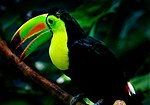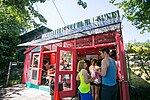Woodland Park (Seattle)

Woodland Park is a 90.9-acre (36.8 ha) public park in Seattle's Phinney Ridge and Green Lake neighborhoods that originated as the estate of Guy C. Phinney, lumber mill owner and real estate developer. Phinney died in 1893, and in 1902, the Olmsted Brothers firm of Boston was hired to design the city's parks, including Woodland Park. The park is split in half by Aurora Avenue N. (State Route 99). Its western half is given over to the Woodland Park Zoo. Its eastern half, which is connected to the zoo by arched bridges over the highway and often called Lower Woodland Park, consists of trails, an off-leash dog park, a picnic area, ballfields, a miniature golf range, horseshoe pits, BMX bike course, and lawn bowling, and is contiguous with Green Lake Park.
Excerpt from the Wikipedia article Woodland Park (Seattle) (License: CC BY-SA 3.0, Authors, Images).Woodland Park (Seattle)
West Green Lake Way North, Seattle Phinney Ridge
Geographical coordinates (GPS) Address Nearby Places Show on map
Geographical coordinates (GPS)
| Latitude | Longitude |
|---|---|
| N 47.668055555556 ° | E -122.34388888889 ° |
Address
Woodland Park North Tennis Courts
West Green Lake Way North
98103 Seattle, Phinney Ridge
Washington, United States
Open on Google Maps






